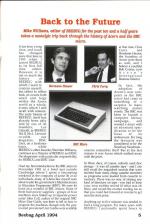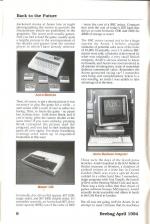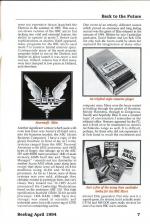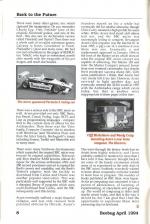
Beebug
 1st April 1994
1st April 1994
Categories: Retrospective
Author: Mike Williams
Published in Beebug Volume 12 Number 10
Mike Williams, editor of Beebug for the past ten and a half years takes a nostalgic trip back through the history of Acorn and the BBC micro.
Back To The Future
It has been a long time, and much has changed since that time in 1983 when I joined Beebug as its first full-time editor. However, it is not so much the history of Beebug with which I want to concern myself, but rather to reflect back on events both small and large within the Acorn world as a whole, events which I still recall with interest.
The early history of Beebug itself has already been ably told by one of its founders, Lee Calcraft, in Beebug Vol. 11 No. 1. Lee now co-edits our magazine, RISC User, on a freelance basis, while Beebug's other founder, Sheridan Williams, continues as a Director of Beebug and RISC Developments with particular responsibility for Beebug and RISC User.
I had my first introduction to the BBC micro in November 1981 in a hotel just outside Cambridge where I spent a fascinating weekend in the company of some 30 or so individuals, many of whom like myself were about to join the government's Microelectronics in Education Programme (MEP). We were let loose on a roomful of BBC micros. None of them had power supplies - groups of four machines were linked up to separate power units! John Coll, author of the original BBC Micro User Guide, was there to tell us how to program the machines, though only the grey covered provisional User Guides were available at that time. Chris Curry and Hermann Hauser, the founders of Acorn were there as well, and I believe a youthful Bob Coates, now Acorn's International Business Director.
In fact, the adoption of Acorn's new computer as the BBC micro had come as something of a surprise to many watching earlier events. The BBC was keen to launch a computer literacy campaign, and wanted a micro with an advanced specification to be the focus of its endeavours. For long the favourite was considered to be the Newbury Newbrain - anyone remember that? But at the last minute it was Acorn which walked away with the prize.
In those days, of course, nobody used disc storage - it was all cassette tape - and I can still recall the anguished sounds that were emitted from many cheap cassette recorders as programs were loaded from cassette to memory. There was no way of storing any kind of directory on tape - you had to keep your own written record of what was on there, and record the counter reading too so that you could fast forward or reverse to get near the start point.
Anything up to five minutes was needed to load a long program. For many years with Beebug I personally spent hours in darkened rooms at home late at night photographing the screen to provide the illustrations which we published in the magazine. The worst were usually games. First you had to load the game, usually quite a lengthy process to the accompaniment of the shrieks and groans from the cassette player to which I have already referred. Then, of course, to get a decent picture it was necessary to play the game for a while - a start screen with a score of zero is rather too boring. Then, to freeze the game - no pause key in those days - hold down Break, and if you're lucky press the camera shutter at the same time! If you were unlucky, pressing Break corrupted the picture (and the program), and you had to start loading the game all over again. Too many frustrating evenings were eaten up in anguished frustration in this way!
Eventually, disc drives did appear, 40T 100K single sided, and 80T 400K double sided. If I remember correctly, an Acorn dual 80T drive (total capacity 800K) cost of the order of 800 - twice the cost of a BBC micro. Compare that with the cost of today's IDE hard disc drives at costs between 100 and 200 for 40Mb of storage or more!
The BBC micro turned out to be a huge success for Acorn. I believe original estimates of potential sales were of the order of 10,000. Eventually over 1.5 million BBC micros were sold, a fantastic achievement by what was originally a very small British company. Acorn's success seemed to know no bounds, and Acorn was soon involved in all manner of enterprises, some of somewhat dubious commercial value. Remember the Acorn sponsored racing car? I remember once being sent complimentary tickets to a race meeting, an invite I was unable to take advantage of at the time.
Those were the days of the lavish press launches: Aviator launched at the RAF Battle of Britain museum at Hendon, a database of cocktail recipes at a wine bar in Covent Garden (there was even a special Acorn cocktail in a rather lurid blue I remember), magic programs with Paul Daniels, the launch of Revs at the Steering Wheel Club and more. There was a time when that then doyen of games software houses, Micropower, would annually invite journalists and others to lunch at the Cafe Royal in London.
But all was not going well for Acorn. In an attempt to meet criticism that its machines were too expensive Acorn launched the Electron in the summer of 1983. This was a cut-down version of the BBC micro but lacking one vital and essential feature, the ability to operate in mode 7. Before such sophistications as shadow RAM appeared, many programs for the BBC micro used mode 7 to conserve limited memory space. Consequently many of the most popular programs failed to run on the Electron, and despite its glitzy launch it was never a real success. Indeed, rumour has it that many were later dumped at low prices in Holland, and elsewhere.
Another significant venture which sunk with even less trace was Acorn's ill-fated entry into the business market, the ABC (Acorn Business Computer). I have a copy of the glossy brochure in front of me as I write: systems ranged from the ABC Personal Assistant with 6502 processor and 640K bytes of floppy disc storage, up to the ABC 310 with 80286 main processor, 1Mb of main memory, 10Mb hard disc and "Desk Top Manager" - sounds not too dissimilar to another Acorn A310 which came along later, except that these were all based on 8-bit machines using 16-bit and 32-bit co-processors. As far as I know, none of these systems was ever sold, although they certainly existed in prototype form, and very classy they looked too. In 1985 Acorn announced the Cambridge Workstation based on the prototype ABC 210. This high specification machine (32016 32-bit second processor, IMb RAM, 10Mb hard disc storage) was aimed at scientific and industrial users, but with a price tag of 2700 was not an outstanding success.
One event of an entirely different nature which proved an enormous and long lasting success was the game of Elite released in the autumn of 1984. Written by two Cambridge graduates, David Braben and Ian Bell, Elite not only took the Acorn world by storm but captured the imagination of many other computer users. Many were the hours wasted in battling through the grades of Harmless, Mostly Harmless, through to Dangerous, Deadly and hopefully Elite. It was a constant topic of conversation I remember in the editorial office. Versions appeared for the PC, and it lived on to be resurrected on Acorn's Archimedes range as well. It is difficult, perhaps, for those who did not experience it at first hand to recall the excitement and interest Elite generated. Not only was it a superb game, for its time, but it actually made CP/M and MS-DOS users really envious for once of us mere BBC micro mortals.
There were many other games, too, which captured the imagination. Do you remember Chuckie Egg, Frak, Defender (one of the original Acornsoft games, and one of the best - this also saw an Archimedes version called Planetoid) and Repton? Then there was a whole rash of so-called adventure games, Gateway to Karos, Countdown to Doom, Philosopher's Quest and many more. We had our own adventurer in the pages of Beebug too, Mitch', who kept us entertained month after month with the escapades of his pet dragon, and much else besides.
There was a serious side to the BBC micro as well. Acorn provided not only BBC Basic, but Pascal, Comal, Prolog, Logo, BCPL and Lisp as programming languages - compare that to the current state of affairs for the Archimedes. Then there was the View family, Computer Concepts' rise to stardom with Wordwise (and Wordwise Plus) and then the Inter family, Beebugsoft's range including Exmon, Toolkit and Masterfile and so many more.
There were many hardware developments which expanded the original BBC micro way beyond its original capabilities. Sideways and then shadow RAM became almost de rigeur for the serious enthusiast, 6502 and 780 second processors arrived to expand the Beeb's power and capability, and the Beeb's Teletext adaptor with the facility to download from Ceefax and Oracle was another popular innovation. This was particularly well supported by the BBC with a changing library of programs which users could download from Ceefax, until the BBC subsequently axed this facility.
Acorn eventually suffered a major financial collapse, and was only rescued from potential oblivion by Olivetti. Acorn's founders stayed on for a while but eventually left for relative obscurity, though Chris Curry retained a high profile for some while. While Acorn had stood still others had not, and the BBC micro was increasingly failing to compete. Revamped Acorn's first response was the interim B+ in June 1985, a pig's ear of a machine if ever there was one. Eventually a real replacement appeared in January 1986 in the form of the Master series which showed what the original BBC micro concept was capable of achieving. The Master 128 and later the Master Compact rescued Acorn from near terminal catastrophe, but despite their moderate success many felt, with some justification I think, that Acorn had very nearly left it too late. However, Acorn survived to fight another day, and eventually entered the 32-bit world in 1987 with the Archimedes range which exists today, but that is another story inappropriate to these pages at this time.
This trawl through the history books has no doubt been highly selective, and I have probably omitted to mention far more than I have told. Tt has, however, brought back to me some of the heady excitement which many of us experienced in the early days of the BBC micro. Suddenly everybody wanted to know about computers; everyone wanted to learn how to program. The number of books published on BBC Basic were legion.
As far as computing was concerned it was a period of adolescence, of learning, of experimenting, of enjoyment and growing up. The world of computing is older (and maybe wiser) today, and that is the way it should be, but I am glad that I had the opportunity to experience those more pioneering days at first hand.
This article was converted to a web page from the following pages of Beebug Volume 12 Number 10.





